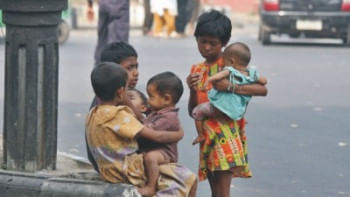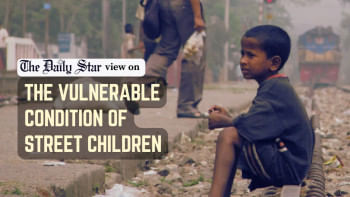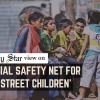Protect street children from sexual abuse

Not long ago, we wrote an editorial expressing our concern about the plight of street children who continue to live in a state of deprivation, humiliation, and abuse. However, one particular issue that is not discussed or studied enough is the sexual abuse these children, especially girls, face. There could be as many as 34 lakh street children living without parental care in Bangladesh, as per a UNICEF study, but even those having parents are equally vulnerable to such abuse due to the lack of legal and institutional safeguards. In Dhaka, where the majority of them live, the situation is particularly concerning.
A correspondent of this daily recently spoke to 15 such children, mostly adolescent girls, whose experiences highlight the urgent need to ensure the safety of street children. Among them is Amina, a 14-year-old girl who spends her days selling flowers. She tells us of the constant fear she faces as she navigates her daily routine: "Sometimes men touch my hands and shoulders when I sell them flowers. Sometimes, they even offer to take me elsewhere." At night, when Amina seeks refuge in Suhrawardy Udyan, the fear of assault overwhelms her: "Night is a horrible time for me. I always have to be cautious, worrying what if someone does anything bad to me."
Sadly, Amina is not alone. UNICEF says that many street children sleep alone or in groups for safety, and one-third experience violence during sleep. A study by the Ministry of Social Welfare sheds further light on this, stating that 46 percent of female children experience sexual abuse. This abuse takes many forms. Girls who change clothes in public spaces often face harassment from male pedestrians. They also frequently encounter unwanted physical contact and threats of sexual assault at night. Without parental guidance, some children also begin to engage in unsafe sexual activities themselves, often due to early exposure to abuse. Some are exploited by promises of marriage or a better life, sometimes in exchange for as little as Tk 10. Drug addicts, policemen, rickshaw pullers, bus drivers—the list of abusers is long.
Against this backdrop, it is imperative that the authorities take decisive measures to ensure the safety, dignity and wellbeing of children living on streets. While the government has shelters and other services to protect them, the reality is that these are not effectively reaching most children. The lack of a comprehensive legal framework surrounding child protection further exacerbates the problem. We, therefore, must prioritise addressing sexual abuse among street children and overhaul the existing support system to make it truly effective.


 For all latest news, follow The Daily Star's Google News channel.
For all latest news, follow The Daily Star's Google News channel. 








Comments